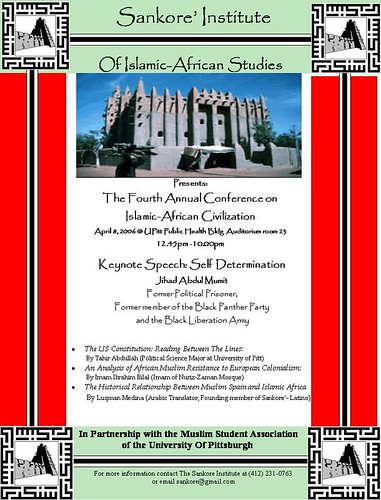Thursday, April 27, 2006
Essay On The Apologists
Marqas
Monday, April 24, 2006
hail polygamy
The heavens forbid,
But that our loves and comforts
Should increase,
Even as our days do grow.
- Shakespeare, Othello
From the Jamaica Observer: Hail Polygamy by Tony Robinson
This article isn't from a Muslim perspective, but it does offer a pragmatic (leaning towards irrevernt) look at a subject with some connection to Islam.
For the record, I'm not gung ho about polygamy. It is obviously not for everyone and there are special challenges faced by polygamous marriages in contemporary times. Everyone involved has to work harder to be respectful of the other people's feelings and not everyone has the patience, discipline, or tolerance inside them to make it all work. A close Egyptian friend of mine had her father "marry on" her mother and it wasn't a good scene.
At the same time, in some contexts I think it can make a lot of sense. And in modern times, when Western societies are redefining in basic ways what the institution of marriage even means, it is kind of funny to me that there aren't more people advocatating for what is arguably a very "traditional" and time-tested structure.
return of the janjaweed
Friday, April 21, 2006
the urban background of enslaved muslims in the americas
Abstract:
Enslaved Muslims constituted a relatively small proportion of the enslaved population in the Americas, and that population was largely male. This article explores an unappreciated dimension of the background of these enslaved Muslims, the fact that most came from towns and had traveled widely, between towns; that is enslaved Muslims tended to come from urban settings, no matter where they ended up in the Americas. This urban background has implications in terms of the experiences and expectations of the enslaved. The urban context was associated with commerce, craft specialization, literacy, and political and social consciousness of slavery and its meaning within west Africa. The study examines available biographical information on enslaved Muslims from the Western Sudan, usually referred to as Mandingo or some variant in the Americas, and those from the Central Sudan, including Hausa, Yoruba, Nupe and people from Borno. The urban setting of Muslim areas of West Africa is then compared with other towns and cities in the Atlantic world during the eighteenth and nineteenth centuries in terms of size of towns and multicultural backgrounds of urban populations, further demonstrating that the urban background of many enslaved Africans and the extent to which the enslaved population was moved between towns has not been appreciated.
Tuesday, April 11, 2006
The Salafi Conversation
M...
Monday, April 10, 2006
Finally, she postin' somethin'
The Souls of Modern Day Black Folk
SBW Syndrome and African-American Marriages
Wednesday, April 05, 2006
fourth annual conference on islamic african civilization

Saturday April 8th, 2006
12:45 pm - 10 pm
The Fourth Annual Conference on Islamic African Civilization
Public Health Auditorium, Rm. 23
(located on Fifth Ave. bet. Bouquet St. and Oakland Ave.)
University of Pittsburgh
Lectures Include (in order of schedule):
The U.S. Constitution: Reading Between the Lines
An Analysis of African Muslim Resistance to European Colonialism
The Historical Relationship between Muslim Spain and Islamic Africa
Keynote speaker: Jihad Abdul-Mumit, former Political Prisoner, Black Panther Party Member, and Black Liberation Army Member, speaking on "Self Determination"
